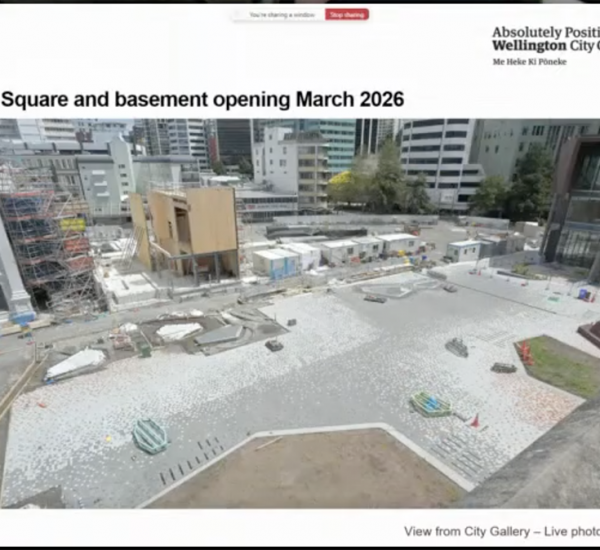Today we are all to receive words from on high – if not exactly a set of commandments carved in stone, then at least close to it, as John Key says this will solve everything. Housing, apparently, is uncontrollable by countries around the world, and yet JK is going to solve it with a Policy Statement.

This Policy Statement is apparently going to go something along the lines of: Auckland Council – sell more land to the People! And if you don’t do that, we’ll force you to sell your land, or replace Len Brown with a bluish coloured commissioner who will.

I’ve yet to see a Policy Statement from any government that really has an effect on anything. In Britain, they issued Planning Policy Guidelines, in a very serious manner, and yet no one paid them the slightest bit of notice. Here, we have had a few policy statements before, on Fresh Water, and things like that. There is an upcoming Policy Statement due soon on Urban development, linked here, which could be the one Key is talking about. So: watch out. Land development is about to happen. One guess for Auckland: upwards, or outwards? The rich, blue voting people of Remuera and St Heliers have spoken and said they want intensification, but not in their back yards. In truth, that’s mostly because they have already sold off their back yards already, and as a suburban spread, it’s not like Mt Albert, where section sizes are still large, with an eighth of an acre of lawn pushing up the daisies.

It’s most likely that the Gov won’t say “more intensification of existing suburbs” as that will just lose them popularity in those true blue states (but they’ll never go and vote red – if anything, they’ll look blue and go purple, or black, or yellow, or anything but red and green). So it is bound to be: “Go West young man”, or “Go South and build all over that fertile ground in Pukekohe”. You know those Bombay Hills, all covered in lettuces and carrots in a rich red soil?

Then – and Now

Owned by careful Chinese gardeners like Mr Aah Chee, Mr Yung, and (above), Mr Fong, for the last generation or two, working 12 hour days growing vegetables, for modest returns. Once they are forced to sell, and with their land priced in the millions, they will sell, and Auckland will grow south, and strangle itself even further. Auckland, like a cancer, grows fast and uncontrolled. And you know what happens with cancer.

So I’m very glad that we don’t have those growth issues here in the capital. Instead of uncontrolled growth, we have small, gradual, sensible growth, with reasonable intensification and infilling of inner city land, and some increasing sprawl at the outer edges. We have growth planned along our public transport spine, with more housing planned for Kilbirnie, Newtown, Te Aro, and Johnsonville (whether J’ville likes it or not). We’re also planning more housing in places like Newlands, up on top of the plateau, which will rely heavily on cars, and makes less sense to me. Our roads are already quite full.






So, in case you’re interested, the draft National Policy Statement is here:
http://www.mfe.govt.nz/publications/towns-and-cities/proposed-national-policy-statement-urban-development-capacity
In it, it says:
Objective Group A – Outcomes for decisionâ€making
OA1: To support effective and efficient urban areas that enable people and communities to provide for their social, economic and cultural wellbeing.
OA2: To provide sufficient residential and business development capacity to enable urban areas to meet residential and business demand.
OA3: To enable ongoing development and change in urban areas.
Objective Group B – Evidence and monitoring to support decisionâ€making
OB1: To ensure plans and regional policy statements are based on a robust, accurate and frequentlyâ€updated evidence base.
Objective Group C – Coordinated evidence and decisionâ€making
OC1: To promote coordination within and between local authorities and infrastructure providers in urban areas, consistent planning decisions, integrated land use and infrastructure planning, and responsive planning processes.
Objective Group D – Responsive planning
OD1: To ensure that planning decisions enable urban development in the short, medium and longâ€terms.
OD2: To ensure that in the short and medium terms local authorities adapt and respond to market activity.
And also:
PB1: Local authorities must, by the end of 2018, or within 12 months of becoming a Medium or High Growth Urban Area, and thereafter on at least a threeâ€yearly basis, carry out:
ï‚· A Housing Assessment that estimates the demand for dwellings, including the demand of different groups in the population for different types of dwellings, locations and price points, and the supply of development capacity to meet that demand, in the short, medium and longâ€terms; and
ï‚· A Business Land Assessment that estimates the demand for the different types and locations of floor area for the local business sectors, and the supply of development capacity to meet that demand, in the short, medium and longâ€terms.
This stuff does my head in! And there is 38 pages in total !
There is, of course, an art to writing this sort of stuff – and sometimes an even more specialised one in deciphering it. Mainly it rolls around in unobjectionable adjectives: “robust”, “integrated”, “effective”, “efficient” until it reeks of them. What it enables, promotes or prohibits will doubtless earn a few lawyers a lot of money, Done cunningly enough it will allow successive waves of politicians to define it however they like.
As an naive, ambitious youth I rather fancied working for the Commission for the Future. Macro planning, “thinking big”, is so far out of favour now I doubt that even a Kiwi Corbyn or Sanders would dare suggest a rebirth of central planning, so who’s going to make a difference here? Probably not Andrew Little.
My biggest dismay is around the cult of the landlord. How many of the blighters are there anyway? How many properties do they own? How much tax do they dodge? Why do they get Accommodation Supplement payments when local authorities don’t? Surely these are the fundamental policy questions whose absent answers have given us the worst of renter cultures where there is no security of tenure, no incentive for tenants to maintain, let alone improve properties and no way to cross over into ownership.
The Cult of the Landlord indeed – or rather, the Cult of the Selfish Investor Prick. There has been a nasty rise in the growth of “Property Investors” of which the few I have come in contact with have been really fairly loathsome people. Not so much a Landlord, looking after the property as a means to help a fellow human be housed, they instead are focused solely on making more money. They have their own magazines – probably several magazines, like Property Investors Monthly, and just seem very focused on screwing everyone else so that they can end up being a millionaire at other people’s expense. Interestingly, many National Party MPs are heavy on property investment, but relatively few Labour Party MPs are.